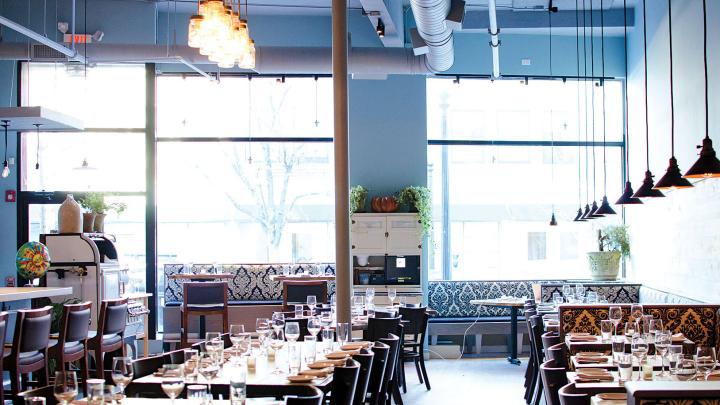Billed as an “urban farmhouse” that pays homage to the chef’s family farm, Puritan & Company is the newest member of the Inman Square restaurant scene. Two long tables for group dining set the tone in the center of the open room; we sat at a two-person table near the lively kitchen, which felt just as communal.
The interior has an airy, clean, look, with its high ceilings, creamy woodwork, and gray-blue walls, tinted a bit lighter than the color of a robin’s egg. We liked the spacious white bar top, too, and the evocative decorative details: the 1920s porcelain-coated stove at the entrance, and a hutch with big metal hinges.
Clean and thoughtful also sum up the food: morsels of meat (think duck egg and pork belly) are doted over, and a range of vegetables arrives unadulterated by sauces—or even much cooking. The shaved and seared broccoli salad ($12) had a faintly Asian-styled thin brown dressing and was downright crunchy. The kitchen must want to ensure that all the cruciferous vegetable’s beta carotene, vitamin C, and soluble fiber still hold sway post-ingestion. The broccoli tasted delicious, as though we’d hacked it off its root and taken a hulking bite right there in the noonday sun. The “Little Gem” salad ($10) also featured lettuce so crisp it could practically stand up on its own. A thick sprinkling of fresh herbs—such as dill, spearmint, and oregano—excited the palate, obviating the need for any other vegetables. (No doubt chef Will Gilson learned the art of “herbing” from his family’s Herb Lyceum and restaurant; see “Rustic Charms,” July-August 2011, page 12K.)
But someone in the kitchen is also clued in to bread. The house-made potato Parker House rolls were warm, spongy mouthfuls of comfort, easily pulled apart. And each bite fed some deeply buried, hungry inner child.
The carefully constructed gougères ($6), pastry dough infused with rosemary and cheddar mornay sauce, were golf-ball-sized treats. More surprising was a fun little dish called swordfish pastrami ($13), Gilson’s take on the Reuben sandwich. Thin slices of lightly smoked fish, encrusted with peppers, came curled over something brown, beside a delightful mustard gelato. The flavors were crazily good, especially grounded by the brown stuff: puréed pumpernickel bread.
The black pepper pasta entrée ($17) featured fine homemade noodles with mushrooms (there could have been more of those), but the sauce tasted too much of salt and vinegar. The roasted chicken ($24) was simply that—juicy and delicious, having been seriously brined. Sunchoke purée added an earthy bite, as did fingerling potatoes cooked to perfect firmness.
Desserts change often. The homey butterscotch pudding ($7) was rich and sweet and thick, almost like an Indian pudding. (Sweet fiends might have chosen the more highfalutin molten chocolate cake, for $1 more, instead.)
Opened last November, Puritan & Company (named for the cake factory once located in its space) has already won several awards—and is beloved by local residents.
That’s just what the owners, who include Gilson, Eugenia Huh ’04, and her husband, MIT graduate Ming-Tai Huh (a financial manager who largely put the project together), had hoped. The Cambridge couple, new to the restaurant industry, got married in the Puritan space last fall, while it was still under construction. The creative venture has been inspiring. “I love being part of a local business, where people want to come,” says Eugenia Huh, who does marketing for a law firm, “and being part of what makes Cambridge unique and vibrant.







